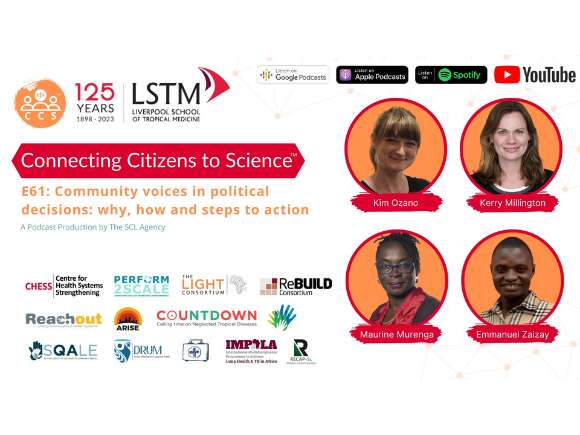
In this two-part mini-series we are focusing on health systems strengthening- what it is, how to do it and what action is needed to ensure that the approach is embedded in discussions at key global events and discussion platforms.
This episode follows on from the first episode from the Centre for Health Systems Strengthening at the Liverpool School of Tropical Medicine, which focused on the health diplomacy and how researchers can advocate for health systems strengthening approaches and community voices in health diplomacy spaces.
This episode features:
We hear from two advocates who have been acting within health diplomacy spaces and as researchers.
We hear from Emmanuel Zaizay, who is affected by the Neglected Tropical Disease Buruli Ulcer, about his experience of growing skills and capacity to communicate the needs of people affected by stigmatising neglected tropical diseases.
We also hear from Maurine Murenga, a TB advocate who has represented the TB community in high level UN meetings. She is open and honest about both the strengths and opportunities of being an advocate, but also what this means to her on a personal level. Her open reflections are really critical to how researchers function when engaging with communities.
Episode guests:
Dr Kerry Millington - Research Uptake Manager, Liverpool of Tropical Medicine
Kerry has been working in global health for over 20 years with a keen focus on ending the tuberculosis epidemic. A key part of her work is developing trusted relationships with range of stakeholders to work in partnership, in collaboration and in a coordinated way ensuring the academic and health professional voice credibly informs decisions that impact on health. This can range from co-creating research ideas to influencing policy and political commitments. A key stakeholder to engage with is the voice of TB survivors and advocates to accelerate action for those in most need of innovations in TB care and prevention to transform lives.
Maurine Murenga - Coordinator of TB Women Global
Maurine Murenga is a passionate advocate for the health, development and human rights of women and children. Maurine’s passion for advocacy is driven by her lived experience, and the inequality and vulnerability that young women and adolescent girls experience in her community.
Maurine is currently the coordinator of TB Women Global, Board Member of Unitaid, Friend of the Fight US and EGPAF Kenya. She is a former board member of the Global Fund to fight AIDS, TB and Malaria and is also a member of WHO's Global Accelerator for Pediatric Formulations Advisory and Union Working Group Gender Equity in TB. In Kenya – Maurine is a member of the Global Fund Country Coordinating Mechanism and Elimination of Mother to Child Transmission of HIV Committee of Experts.
Emmanuel Zaizay – Co-researcher and advocate, REDRESS, Liverpool School of Tropical Medicine
Emmanuel Zaizay is from Lofa County, Voinjama District. He works with REDRESS as a coresearcher and was recruited as a patient affected person having been diagnosed with Buruli ulcer. He also serves as a data collector, working in photovoice settings and participatory methods such as bodymapping and focus group discussions.
Useful links:
- S8E3 - Being a co-researcher with lived experience of an NTD - Emmanuel Zaizay, who is a peer researcher in the REDRESS programme and is affected by Buruli Ulcer, a neglected tropical disease, features in this earlier epsiode. He shares with us the value of learning new skills, through becoming a co-researcher, which has helped him better connect with his community and contribute to the improvement of medical and psychosocial services for people living with NTDs.
- CHESS - Liverpool School of Tropical Medicine - CHESS is a multi-disciplinary group using research and teaching to strengthen health systems and to improve health and well-being amongst the poorest and marginalised in low and middle-income countries (LMIC).
Want to hear more podcasts like this?
Follow Connecting Citizens to Science on your usual podcast platform or YouTube to hear more about the methods and approaches that researchers apply to connect with communities and co-produce solutions to global health challenges.
The podcast covers wide ranging topics such as NTD’s, NCD’s, antenatal and postnatal care, mental wellbeing and climate change, all linked to community engagement and power dynamics.
If you would like your own project or programme to feature in an episode, get in touch with producers of Connecting Citizens to Science, the SCL Agency.
